教科版(广州)英语六年级上册 Module 4 Unit 8 A trip to Hong Kong 课件 (共50张PPT)
文档属性
| 名称 | 教科版(广州)英语六年级上册 Module 4 Unit 8 A trip to Hong Kong 课件 (共50张PPT) |
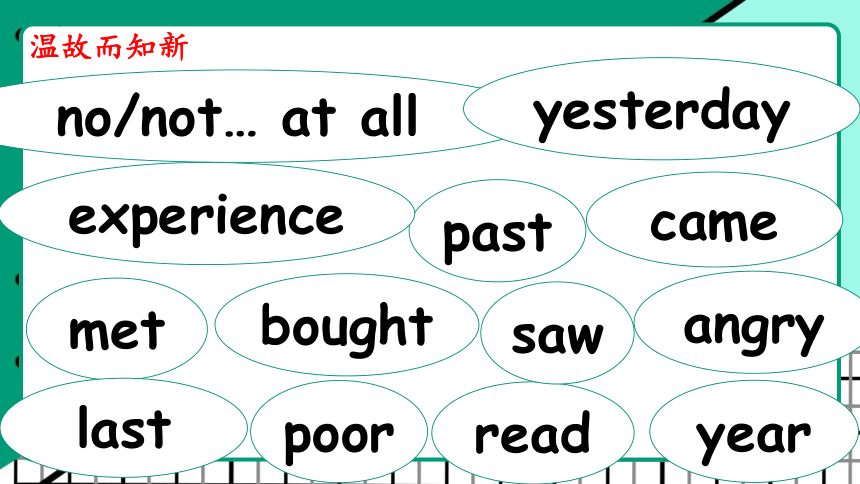
|
|
| 格式 | pptx | ||
| 文件大小 | 8.7MB | ||
| 资源类型 | 教案 | ||
| 版本资源 | 教科版(广州) | ||
| 科目 | 英语 | ||
| 更新时间 | 2022-08-26 14:29:58 | ||
图片预览

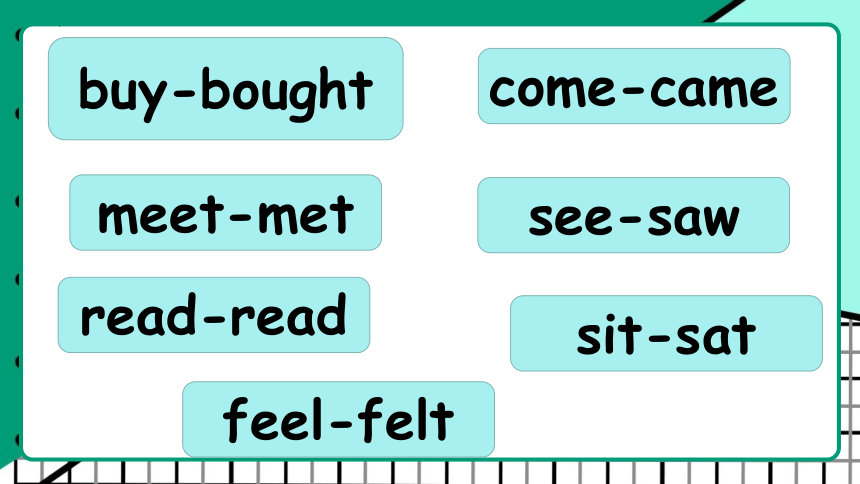
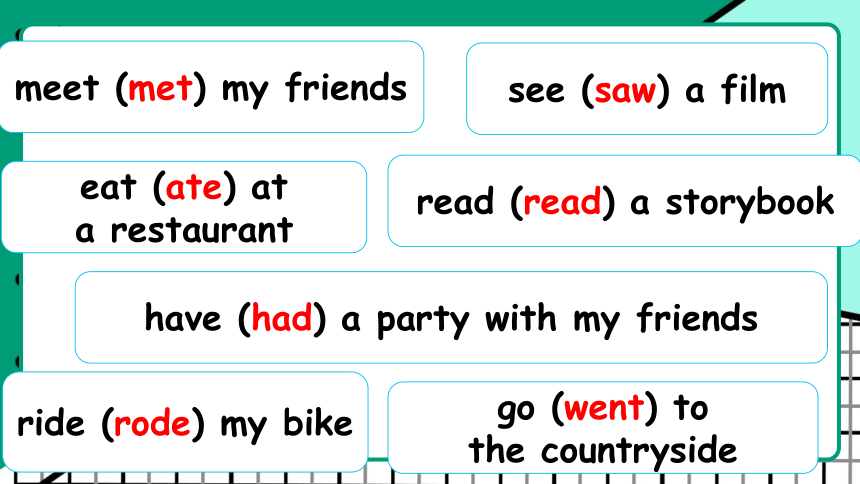
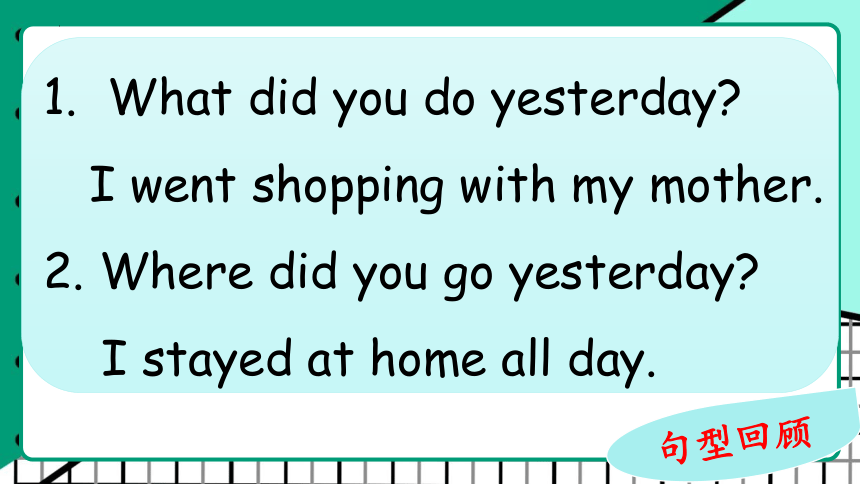

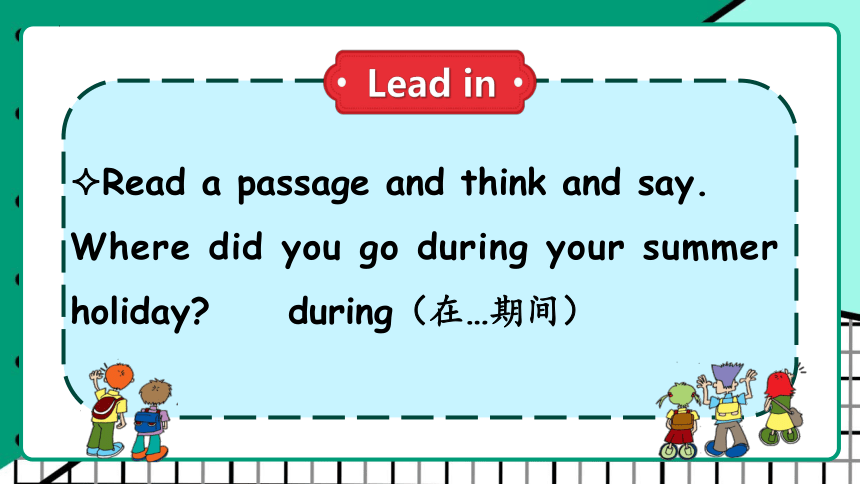
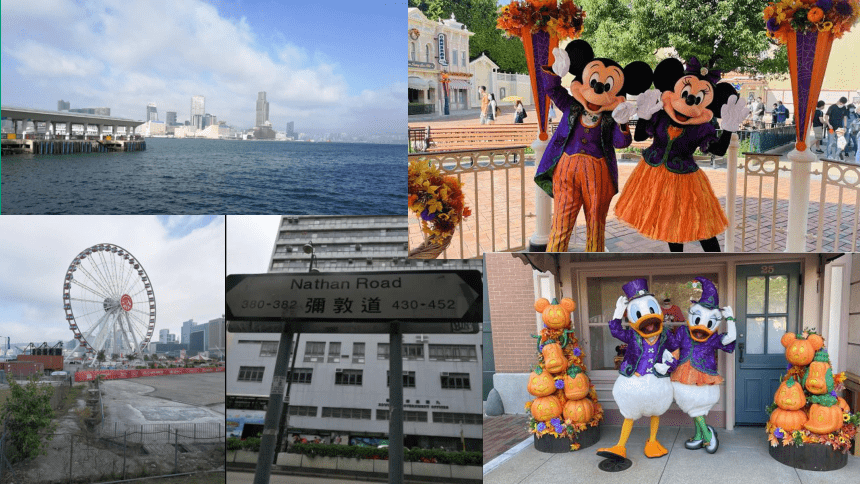
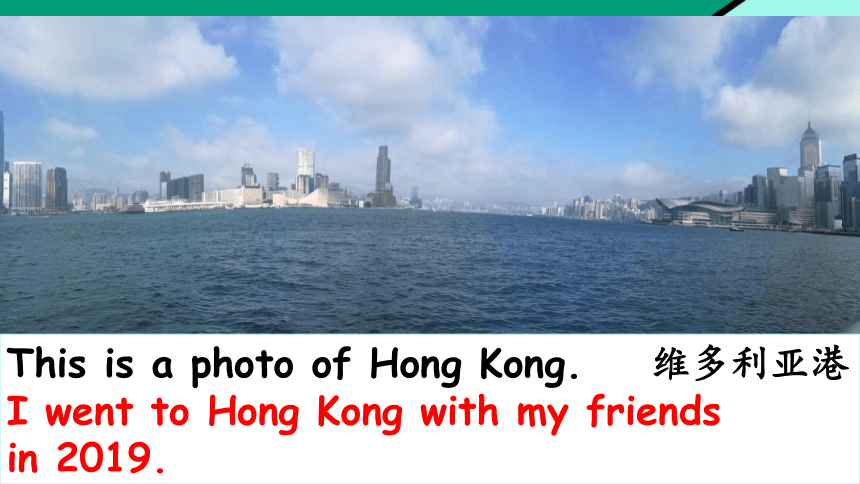
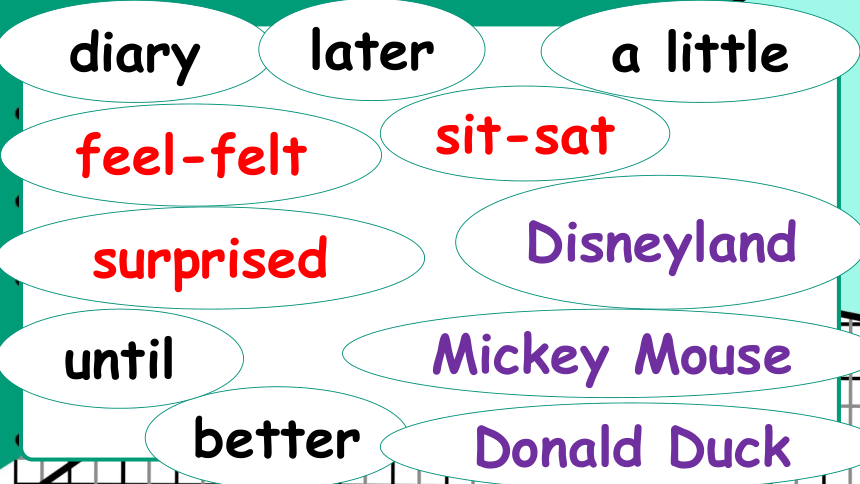
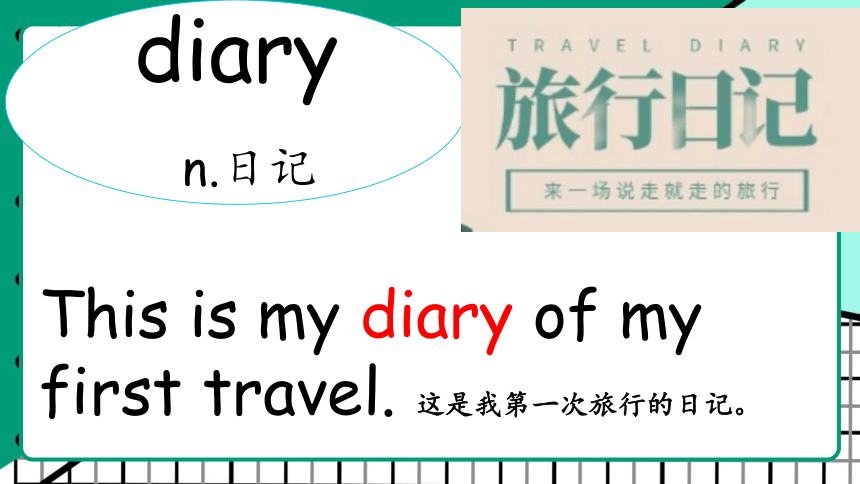
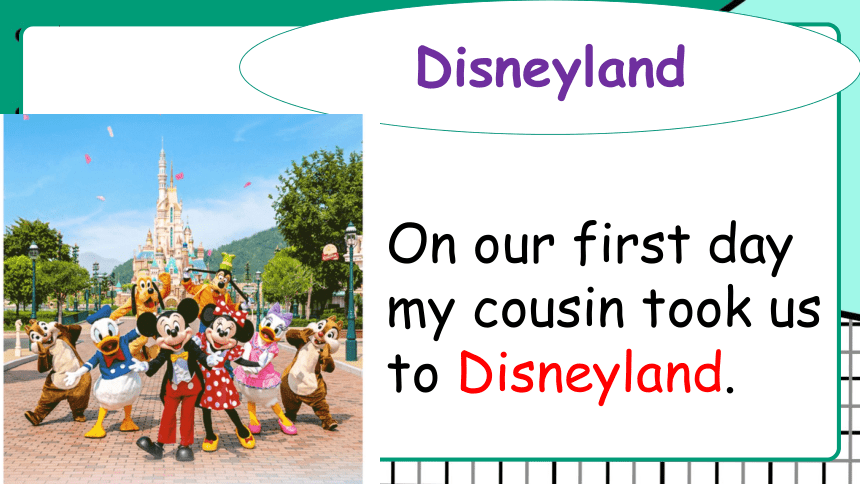
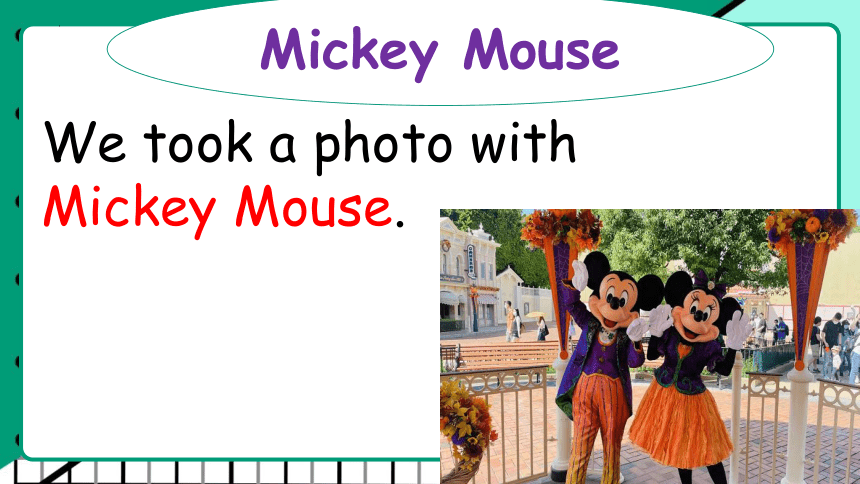
文档简介
(共50张PPT)
past
no/not… at all
experience
bought
poor
angry
met
last
yesterday
year
came
read
saw
温故而知新
buy-bought
meet-met
read-read
sit-sat
see-saw
come-came
feel-felt
meet (met) my friends
eat (ate) at
a restaurant
ride (rode) my bike
read (read) a storybook
see (saw) a film
have (had) a party with my friends
go (went) to
the countryside
句型回顾
What did you do yesterday
I went shopping with my mother.
2. Where did you go yesterday
I stayed at home all day.
Unit 8
A trip to Hong Kong
Module 4 Past experiences
Lead in
Read a passage and think and say.
Where did you go during your summer holiday during(在…期间)
This is a photo of Hong Kong. 维多利亚港
I went to Hong Kong with my friends
in 2019.
diary
Disneyland
feel-felt
later
better
until
a little
surprised
sit-sat
Mickey Mouse
Donald Duck
diary
n.日记
This is my diary of my first travel. 这是我第一次旅行的日记。
On our first day my cousin took us to Disneyland.
Disneyland
We took a photo with
Mickey Mouse.
Mickey Mouse
Donald Duck
We took a photo with
Donald Duck.
a little
一点
I think I ate a little too much because later I felt ill.
later
adv. 后来
Ben sat with me until I felt better.
sit-sat
feel-felt
until
better
surprised
adj. 惊讶的
I was very surprised because I didn’t know they came to Hong Kong, too.
Some phrases in P44
last weekend
his first visit to
on our first day
take us to
went on a trip
lots of different games
go shopping
on the street
talk about
eat a little too much
by train
Let’s read
1. Listen and read the passage together and find out the answers in P45.
11个课文短语,需熟记会默写。
把握课文重点语法:
1. I went on a trip to Hong Kong. 我去香港旅游了。
辨析:journey, travel, trip的区别
①journey 指陆地上的远距离“旅行” 。
I took a journey from Beijing to Shanghai last year.
②travel 指长时间、远距离的“旅行”。
At present, many people are fond of travel in their spare time.
③trip 指时间短、距离近的“旅行、远足” 。
We made a boat trip to the island last week and had a good time.
2.Ben said he was very excited. 本说他非常兴奋。
辨析:say, speak, talk, tell的区别
①say意为“说,讲”,强调说话内容。
②speak强调开口说话、发言的动作。 Can you speak Japanese
③tell 意为“说,告诉”,指将某事讲给别人听,。常用结构为:tell sb sth、tell sth to sb、tell sb to do sth
④talk意为“谈话,讲话”,强调谈话的双方,而不注重谈话内容。常用短语talk to sb、talk with sb,意为“和…交谈”。I want to talk with her.
3.I was very surprised. 我非常惊讶。
辨析:surprised与surprising
①surprising 形容词,意为“令人惊讶的“用来修饰物。
②surprised 形容词,意为“(人)感到惊奇的,吃惊的”,主语一般是人。
如:It’s a surprising story. We all feel surprised.
跟法跟excited, exciting;interested, interesting相似。
4. go on a trip = take a trip 去旅游
“go on a + 名词”可以用来表示进行某项活动,常见短语有:go on a walk去散散步 go on a diet节食;减肥
把握课文重点语法:
5. It was so much fun. 反义句:It was no fun at all.
6. The next day we went shopping.
next day下一天、next week 下周、next month下个月
表示将来,用在一般将来时的的句子中。
比如:I will go shopping next day.
但是!如果在前面加 the,如the next day,那么该句子要用在一般过去时。如: I went shopping the next day.
把握课文重点句型:
Ben said he was very excited because it was his first visit to the island.
On our first day my cousin took us to Disneyland.
We had hamburgers and chips for lunch.
Exercises 1
双基 P53-54 第一课时
Fun with language
P 46-47
写作巩固
选择以下任意一天,用至少40个单词写出你那天的日记。
mind map 思维导图
日记开头如下:
mind map 思维导图
1. Who, When, Where, How
2. 展开What(做了什么), Why(理由)
3. 总结感受
谨记写作6要素!
mind map 思维导图
Sunday, May 2nd Sunny
Dear Diary,
.
.
.
.
写作巩固
选择以下任意一天,用至少40个单词写出你那天的日记。
Saturday, May 1st Sunny
Dear Diary,
Early this morning, I woke up and then brushed my teeth. First, I had milk and bread for breakfast. Second, I went to a friend’s home and watched DVDs together. Third, we went to the park and played basketball. I was excited to have fun together with friends. We had a good time there!
Exercises 2
双基 P54-55 第二课时
Story Time
Watch a video
Read and act.
Exercises 3
双基 P56 第三课时
What do we learn in M4U8
……
conclusion
Words, phrases, sentences, text, grammar, and how to use mind map to write a short passage.
Preparation
Please prepare to read M5U9 words and phrases, and try to read out the passage in page .
past
no/not… at all
experience
bought
poor
angry
met
last
yesterday
year
came
read
saw
温故而知新
buy-bought
meet-met
read-read
sit-sat
see-saw
come-came
feel-felt
meet (met) my friends
eat (ate) at
a restaurant
ride (rode) my bike
read (read) a storybook
see (saw) a film
have (had) a party with my friends
go (went) to
the countryside
句型回顾
What did you do yesterday
I went shopping with my mother.
2. Where did you go yesterday
I stayed at home all day.
Unit 8
A trip to Hong Kong
Module 4 Past experiences
Lead in
Read a passage and think and say.
Where did you go during your summer holiday during(在…期间)
This is a photo of Hong Kong. 维多利亚港
I went to Hong Kong with my friends
in 2019.
diary
Disneyland
feel-felt
later
better
until
a little
surprised
sit-sat
Mickey Mouse
Donald Duck
diary
n.日记
This is my diary of my first travel. 这是我第一次旅行的日记。
On our first day my cousin took us to Disneyland.
Disneyland
We took a photo with
Mickey Mouse.
Mickey Mouse
Donald Duck
We took a photo with
Donald Duck.
a little
一点
I think I ate a little too much because later I felt ill.
later
adv. 后来
Ben sat with me until I felt better.
sit-sat
feel-felt
until
better
surprised
adj. 惊讶的
I was very surprised because I didn’t know they came to Hong Kong, too.
Some phrases in P44
last weekend
his first visit to
on our first day
take us to
went on a trip
lots of different games
go shopping
on the street
talk about
eat a little too much
by train
Let’s read
1. Listen and read the passage together and find out the answers in P45.
11个课文短语,需熟记会默写。
把握课文重点语法:
1. I went on a trip to Hong Kong. 我去香港旅游了。
辨析:journey, travel, trip的区别
①journey 指陆地上的远距离“旅行” 。
I took a journey from Beijing to Shanghai last year.
②travel 指长时间、远距离的“旅行”。
At present, many people are fond of travel in their spare time.
③trip 指时间短、距离近的“旅行、远足” 。
We made a boat trip to the island last week and had a good time.
2.Ben said he was very excited. 本说他非常兴奋。
辨析:say, speak, talk, tell的区别
①say意为“说,讲”,强调说话内容。
②speak强调开口说话、发言的动作。 Can you speak Japanese
③tell 意为“说,告诉”,指将某事讲给别人听,。常用结构为:tell sb sth、tell sth to sb、tell sb to do sth
④talk意为“谈话,讲话”,强调谈话的双方,而不注重谈话内容。常用短语talk to sb、talk with sb,意为“和…交谈”。I want to talk with her.
3.I was very surprised. 我非常惊讶。
辨析:surprised与surprising
①surprising 形容词,意为“令人惊讶的“用来修饰物。
②surprised 形容词,意为“(人)感到惊奇的,吃惊的”,主语一般是人。
如:It’s a surprising story. We all feel surprised.
跟法跟excited, exciting;interested, interesting相似。
4. go on a trip = take a trip 去旅游
“go on a + 名词”可以用来表示进行某项活动,常见短语有:go on a walk去散散步 go on a diet节食;减肥
把握课文重点语法:
5. It was so much fun. 反义句:It was no fun at all.
6. The next day we went shopping.
next day下一天、next week 下周、next month下个月
表示将来,用在一般将来时的的句子中。
比如:I will go shopping next day.
但是!如果在前面加 the,如the next day,那么该句子要用在一般过去时。如: I went shopping the next day.
把握课文重点句型:
Ben said he was very excited because it was his first visit to the island.
On our first day my cousin took us to Disneyland.
We had hamburgers and chips for lunch.
Exercises 1
双基 P53-54 第一课时
Fun with language
P 46-47
写作巩固
选择以下任意一天,用至少40个单词写出你那天的日记。
mind map 思维导图
日记开头如下:
mind map 思维导图
1. Who, When, Where, How
2. 展开What(做了什么), Why(理由)
3. 总结感受
谨记写作6要素!
mind map 思维导图
Sunday, May 2nd Sunny
Dear Diary,
.
.
.
.
写作巩固
选择以下任意一天,用至少40个单词写出你那天的日记。
Saturday, May 1st Sunny
Dear Diary,
Early this morning, I woke up and then brushed my teeth. First, I had milk and bread for breakfast. Second, I went to a friend’s home and watched DVDs together. Third, we went to the park and played basketball. I was excited to have fun together with friends. We had a good time there!
Exercises 2
双基 P54-55 第二课时
Story Time
Watch a video
Read and act.
Exercises 3
双基 P56 第三课时
What do we learn in M4U8
……
conclusion
Words, phrases, sentences, text, grammar, and how to use mind map to write a short passage.
Preparation
Please prepare to read M5U9 words and phrases, and try to read out the passage in page .
同课章节目录
- Module 1 Country life
- Unit 1 What are those farmers doing?
- Unit 2 A country life is a healthy life
- Module 2 City life
- Unit 3 Where are you from?
- Unit 4 I like the city very much
- Module 3 Health
- Unit 5 What's the matter with you?
- Unit 6 The secret of good health
- Module 4 Past experiences
- Unit 7 What did you do yesterday?
- Unit 8 A trip to Hong Kong
- Module 5 Changes
- Unit 9 Was I a good girl back then?
- Unit 10 Then and now
- Module 6 Festivals
- Unit 11 I like the Spring Festival best
- Unit 12 Other festival in China
- Unit 12 Christmas(旧版)
- Module 7 Let's look back
